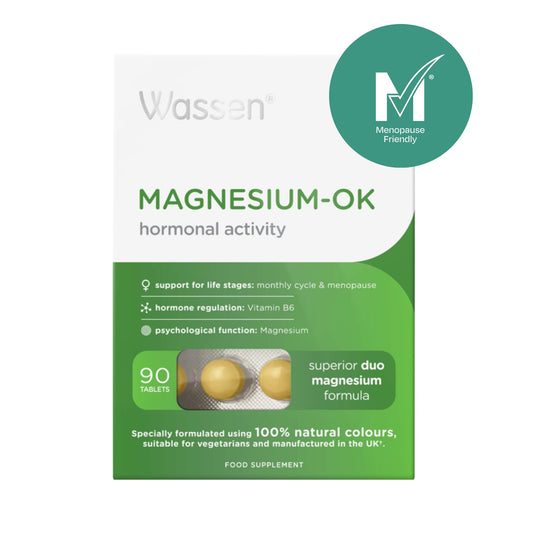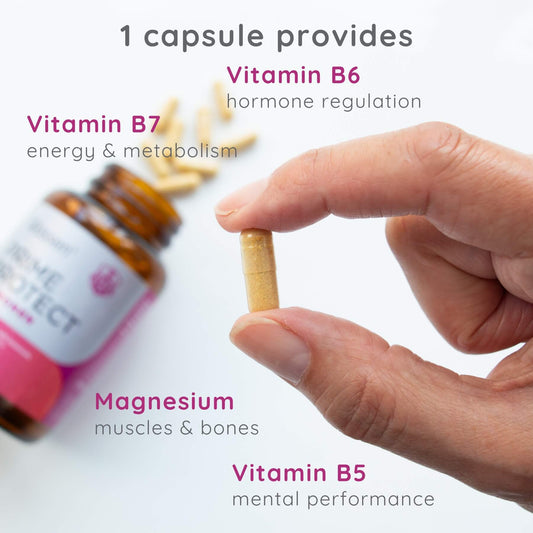Here are some tips to support your hormone balance.
For women, the hormones oestrogen, progesterone and testosterone are responsible for many factors including sexual health. At each lifestage your can hormones change but there are some nutrients that maybe helpful to include in your diet.
Eat foods rich in Vitamin B6
Vitamin B6 is crucial for the maintenance of normal hormonal activity and found in foods including chicken, soya beans, oats and bananas. Taking B vitamins in a B complex is a good idea. Vitamins B6, B12 and Folic acid both support normal homocysteine metabolism. Homocysteine is a chemical found in the body naturally, and elevated levels are associated with age related cognitive decline and poor heart health.6
Up your Essential fats – especially Omega 3 and 6 poly unsaturated fats.
Hormones are made from fats (omega 3, 6 - found in nuts, seeds, and oily fish) combined with protein. The government recommends that we eat two portions of fish a week, one oily.
It is vital that the body is well nourished with omega 3 fats. The omega 3 fats DHA and EPA help support normal heart function at 250mg a day and 250mg of DHA a day helps support normal brain function.
In addition to making sure that you eat enough fish, increase your intake of Essential Fats: replace cheese, milk and butter with alternatives e.g. tahini spread, hummus, a flaxseed oil for dipping, add ‘Good Oil’ to salad dressings, top mashed potato with seasoned seeds (Food Doctor Seed Mixes), use unsweetened soya milk or live unsweetened yoghurt on cereals. Silken tofu is useful for creamy sauces or consistencies in soup.
Phytoestrogens
There are some foods that actually contain plant-sourced oestrogens, these are often seen as phytoestrogens in supplements like Red Clover, Soy Isoflavones, Flaxseed Lignans etc. but are also easy to come by through the diet. These “plant hormones” appear to act as weak oestrogens and are found in the following foods: soy beans / kidney beans (can be added to casseroles with no extra preparation needed if tinned), tofu (marinated or stir-fried), organic soya milk, lentils, garlic, seeds (linseed, sesame, pumpkin, sunflower - added to muesli, flapjack or sprinkled on salads), chickpeas (found in houmous).
Stress and Blood sugar balance can also affect your hormone balance.
All hormones are made up of similar building blocks - proteins and fats. These require the help of a range of nutrients for their manufacture and use. There are plenty of different hormones in the body, not just the ones that are defined ‘sex hormones’ i.e. oestrogen, progesterone and testosterone. Adrenaline and cortisol are also well-known hormones that are associated with stress, and insulin is crucial in blood sugar management. If your body is under constant stress or battling blood sugar imbalances, the resources required to keep our sex hormones under control are also needed for dealing with stressful situations and balancing blood sugar. Both of these processes are prioritised by your body – which makes sense because if you can’t deal with a stressful situation or provide the right amount of energy to your body and brain, it is highly unlikely that you will be able to keep your hormones in check.
Basic dietary strategies to combat this include:
- Eat well, little and often.
- Make sure that you include protein and some fiber within each food choice to slow the release of sugar into the bloodstream reducing chances of a sugar high and subsequent low.
- Book a diary appointment with yourself and just do something for you – a walk, a potter in the local town, a bit of stretching or a nail appointment. Whatever is your thing.
- Exercise is a natural de-stressor but if you are feeling exhausted anyway - go gently, or it can just be another part of your day that is a pressure.





